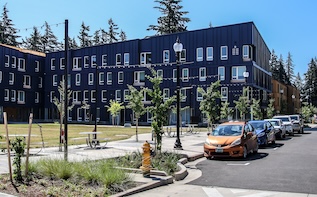- Home
- Urban Design and Planning
- Planning Projects
- Completed Projects
Urban Design and Planning
Completed Projects
This project was about working with the community to make walking, bicycling and using mobility devices better in Gresham, so people can get to where they need and want to go.
The Active Transportation Plan was adopted by City Council on Sep. 4, 2018.
Area residents (and avid bicyclists) Greg Olson and Jeff Corcoran volunteered more than 200 hours to help staff identify bike routes, the best locations, and information to include on the bike signs.
The money saved by their volunteer hours allowed the City to use the majority of the grant funds for this project, $50,000, to make and install the signs that otherwise wouldn't have been possible.
Gresham's bike map and guide is available on water-resistant paper at Gresham City Hall.
Development Code Improvement Project-8 (DCIP-8) was a phase of a multi-year project designed to update the Development Code to reflect current federal, state, and local rules. It was also intended to review the Development Code to ensure that the current needs of the community were being met regarding processes and regulations involved with the development process.
Development Code Improvement Project-9 (DCIP-9) ensured the Development Code was clear and easy to use. This portion of Phase 9 focused on design standards. This included improving the design review process and standards, and the review process for approved designs.
This 2012 Council Work Plan project involved reviewing the 2009 Downtown Plan and some of its implementation items. This included:
- Identifying barriers to development, including Development Code issues
- Identifying potential incentives to spur growth
- Developing funding options for the Center for the Arts Plaza fountain
This project was to ensure the City's environmental overlays and land use districts were based on the most accurate GIS data available, and that the associated Development Code provisions were clearer and more user friendly.
The Federal Emergency Management Agency (FEMA) adopted a new floodplain study and new Flood Insurance Rate Maps (FIRMs). In order to stay in the National Flood Insurance Program (NFIP), the City needed to adopt the maps and have flood management regulations that are in compliance with federal standards. A FEMA audit of the City's current regulations found areas where code amendments were necessary. The City needed to change its code to reflect the federal code in order to stay in the NFIP. The City being a part of the NFIP enables owners of property within the floodplain to purchase affordable federally subsidized flood insurance to insure against property damage during flooding events.
The City Council approved the amendments related to this project at the Dec. 18, 2018 meeting. The amendments became effective on Jan. 17, 2019.
The Food and Beverage Carts project, a component of the Development Code Improvement Project (DCIP), developed clear rules and processes for carts on private property (not on streets and sidewalks) based on community expectations about the role of carts in Gresham.
The City Council approved amendments that changed rules and processes for food and beverage carts and temporary uses at its Oct. 1, 2013 meeting.
The amendments took effect on Dec. 5, 2013.
More about food and beverage carts in Gresham.
The Gresham Butte Scenic View project resulted in amendments to the Comprehensive Plan that are designed to further protect and conserve the scenic views provided by Gresham Butte. Gresham Butte is visible from a large portion of the city and is known throughout the region as one of Gresham’s most treasured resources.
This project amended the City's Comprehensive Plan.
The City Council approved amendments related to this project at its May 19, 2015 meeting. The amendments were enacted on June 16, 2015 and became effective on July 16, 2015.
This Council Work Plan project ensured that Gresham is an attractive place for development by responding to development customers' concerns while also protecting city and community interests. The project also sought to:
- Make Gresham the most competitive location in the Metro region and beyond for industrial development
- Remove other barriers to development concerning residential public infrastructure requirements
City Council voted unanimously to approve Code amendments concerning the Gresham Competitiveness project.
Healthy Eating, Active Living (HEAL) promoted equitable access and opportunities to healthy, affordable food and to active living. It examined how health may be affected by the built environment by promoting access to food options and physical activity through daily routines.
This Council Work Plan project examined the Community Development Plan through a health and equity lens and assessed how current policies related to the built environment achieve healthy eating and active living goals.
The City Council approved the Healthy Eating Active Living amendments at its Feb. 7, 2012 hearing. The enactment reading took place on March 6, 2012. The amendments became effective on April 5, 2012.
The City finalized a visual survey of properties in the southern portion of the Northwest Neighborhood in September of 2014. Eight properties were identified as potential historic resources.
This survey was partially funded by a grant from the Oregon State Historic Preservation Office and focused on buildings that were built from 1937 through the mid-1960’s.
The Housing Policy project provided housing data and information on housing trends that were used to develop housing goals, policies and action measures for Gresham as a whole, the Downtown, Civic Neighborhood and Central Rockwood.
This project also amended parts of the City's Comprehensive Plan.
The City Council approved amendments related to this project at its Oct. 15, 2013 meeting. The amendments were enacted on Nov. 19 and became effective Dec. 19, 2013.
The Institutional Master Plans project created a way for institutions to seek approval of long-term, phased development. The Code provides for 20-year approval of site designs.
The City Council approved the code amendments for the Institutional Master Plans portion of the Development Code Improvement Project - Phase 5 at its Dec. 20, 2011, meeting. The code amendments took effect on Feb. 16, 2012.
The City implemented changes to comply with Senate Bill (SB) 1051, which emphasized the need for statewide affordable housing and was signed by the governor on Aug. 15, 2017. The city amendments focused on changes to rules regarding accessory dwelling units and processing times for projects with an affordable housing component.
The Temporary Uses project, a component of the Development Code Improvement Project, developed clear rules and processes for temporary uses on private property (not on streets and sidewalks) based on community expectations about the role of temporary uses in Gresham.
The City Council approved amendments that changed rules and processes for temporary uses and food and beverage carts at its Oct. 1, 2013 meeting.
The amendments took effect Dec. 5, 2013.
The Tree Code Update project clarified existing rules and addressed outdated tree provisions throughout the Development Code.
Development Code sections pertaining to tree codes include:
The Tree Code Update project carried out an action measure in the Council adopted Urban Forestry Management Plan and aimed to address outdated tree provisions throughout the Development Code.
Changes under the new tree code include:
- Clarified code language and definitions
- Consolidated code sections and tree-related standards
- Reorganized tree rules so information is easily accessible
- Added illustrations to assist in understanding how the rules apply





